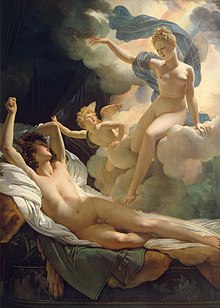Morpheus

Morpheus (/ˈmɔːrfiəs/ or /ˈmɔːrfjuːs/) is the Ancient Greek god of dreams who appears in Ovid's Metamorphoses. Morpheus has the ability to mimic any human form and appear in dreams. His true semblance is that of a winged daemon, an imagery shared with many of his siblings. Robert Burton, in Anatomy of Melancholy, refers to Classical depictions of Morpheus, saying "Philostaratus paints (Morpheus) in a white and black coat, with a horn and ivory box full of dreams, of the same colours, to signify good and bad".[1] In myth, Morpheus was also said to send dreams through one of two gates, one of ivory, and the other of horn. Starting in the medieval period, the name Morpheus began to stand generally for the god of dreams or of sleep.[2]
In Ovid
The Roman poet Ovid states in his Metamorphoses that Morpheus is a son of Somnus and reports that he had a thousand siblings, with Morpheus, Phobetor and Phantasos being merely the most prominent among them.[3]
Derivations
In language
- The name of the opiate drug morphine is derived from the name of Morpheus.
See also
References
- ^ Burton (2001)(Pr. 2, Sec. 2)
- ^ Kearns (1996)
- ^ Ovid (1836) p.54
Bibliography
- Burton, Robert. (2001), The Anatomy of Melancholy., New York, ISBN 9780940322660
{{citation}}: Unknown parameter|editors=ignored (|editor=suggested) (help)CS1 maint: location missing publisher (link). - Griffin, A. H. F. (1997), A Commentary on Ovid, Metamorphoses XI, Hermathena, vol. 162/163, Dublin, JSTOR 23041237
{{citation}}: CS1 maint: location missing publisher (link). - Kearns, E. (1996), "Morpheus", Oxford Classical Dictionary (3rd rev. ed.), Oxford, ISBN 9780198661726
{{citation}}: Unknown parameter|editors=ignored (|editor=suggested) (help)CS1 maint: location missing publisher (link). - Ovid (1836). "Book XI". Metamorphoses.
